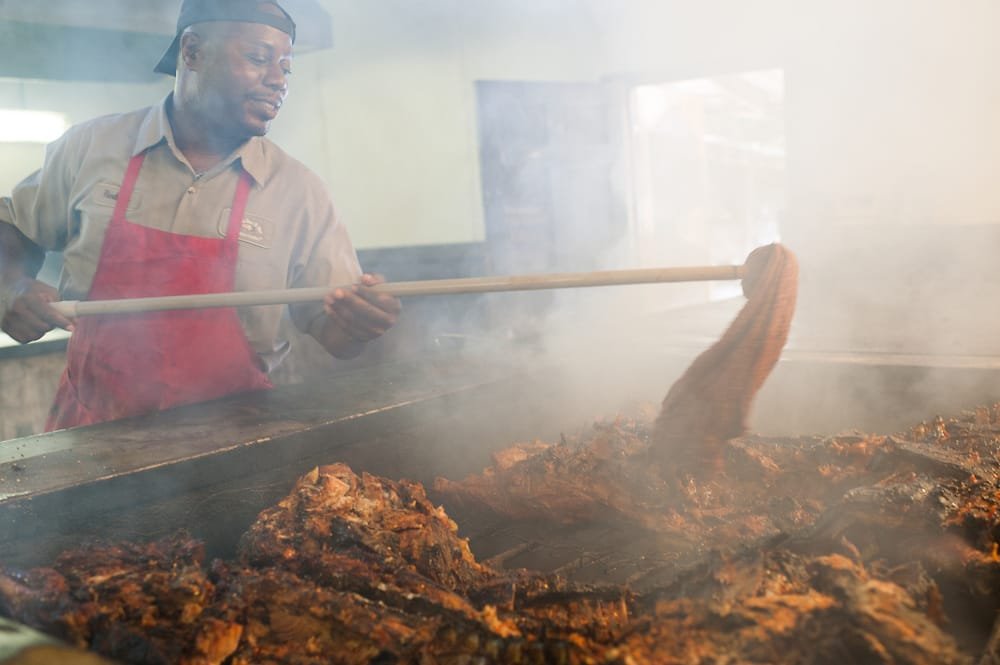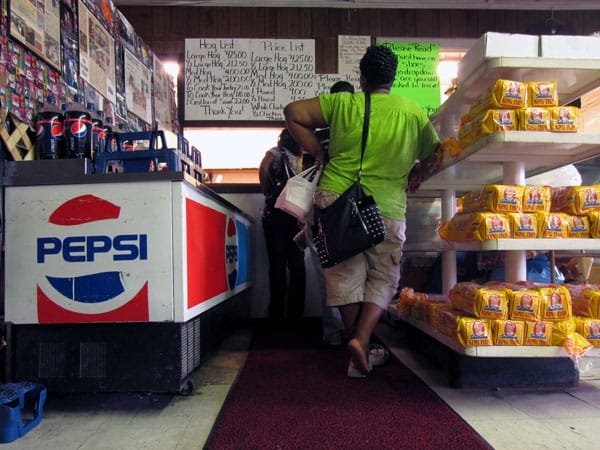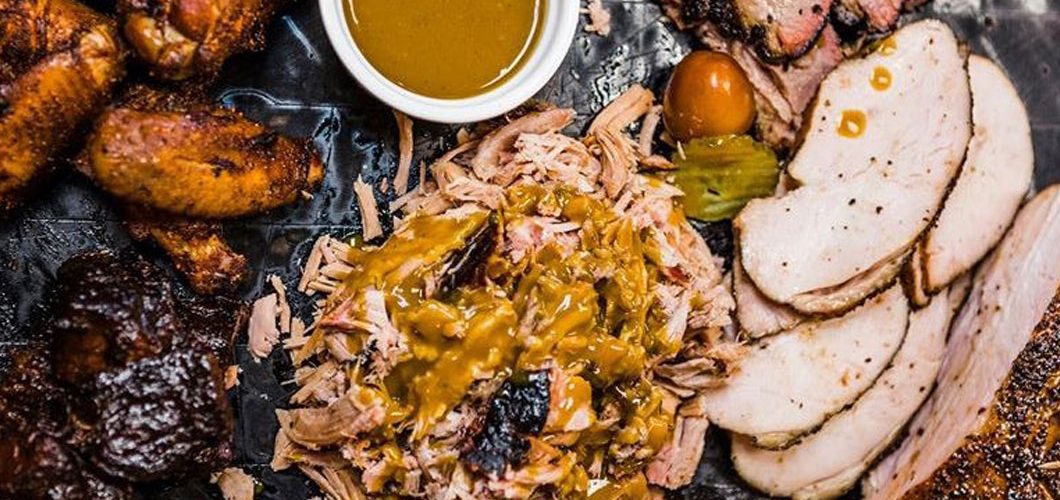Download the South Carolina Tourism’s South Carolina BBQ Trail Map
South Carolina Trail barbecue is known world-wide, but among natives to the state, the sauce is boss.
Like everything in South Carolina, we cook barbecue cantankerously. We smoke our meat with hundreds of opinions and often with a sense of injured pride. Otherwise, it’s just different in South Carolina—all the way down to the way we spell it, more often with the garish and trashy “q” rather than the upwardly mobile and buttoned-down “c.”

Hemingway, South Carolina
Project: South Carolina Barbecue Trail
Photo by Denny Culbert
When you mention S.C., people usually want to start a fight about sauces. The whole state is a big messy spill of sauces—there’s at least four of them. As anyone who’s driven south on Highway 17 knows, though, that vinegar and spices blend famously found all over eastern North Carolina is really more of a culinary wedge that plunges way down the Carolina shore, down past Scott’s in Hemingway and certainly as far south as Brown’s Bar-B-Que in Kingstree and even further south with the pulled pork at Cooper’s Country Store in Salters. The range of the controversial mustard sauce punches up from the lowcountry surrounding Charleston with Melvin’s and straight up the eye” (I-26) to Sweatman’s in Holly Hill (some say, the birthplace of mustard sauce) and further along with a string of Duke’s starting in Ridgeland, Walterboro and Summerville and on up to Orangeburg—before reaching like a clinched fist that throttles Columbia where you can find a light mustard sauce in nearby Batesburg/Leesville at Jackie Hite and also at Shealy’s where they diplomatically also tender a clean-cut vinegar sauce.
South Carolina is the only state in the nation where you’ll find all four of the basic types of barbecue sauce, sometimes on the same menu.
It’s the sauce that determines what kind of barbecue you’re eating in the Palmetto State. When we say “barbecue” around here, we’re always talking about pork.

Beef, chicken and other critters can be grilled or cooked with or without sauce, but only pork — most often pulled pork cooked in a smoky pit — is barbecue.
South Carolina is home to four barbecue sauces: mustard, vinegar and pepper, light tomato and heavy tomato. The sauces are sometimes mopped on during the cooking process or can be served on the side, a subject of much debate among barbecue pit masters.
South Carolina Trail mustard
Some people think of mustard-style barbecue as South Carolina’s unofficial sauce because this is the only place you’ll find it. It’s most popular in the middle of the state, where German families settled in the 1700s. Those German immigrants brought their love of mustard to the region, and it soon combined with the love of pork for a lovely, tangy result.
Vinegar and pepper sauce, the most popular style along the coast, is perfect for those who love a bit of heat. The acidity of the vinegar works magic with the pork. It’s also the oldest sauce, perhaps the oldest in the nation, and has been traced back hundreds of years.
The light tomato sauce is basically a vinegar and pepper sauce with ketchup added for a little sweetness. It’s most popular in the Pee Dee Region (the northeast corner of the state) and in the upper middle part of the state.
A heavy, tomato-based barbecue sauce is found in the western and northwestern corner of South Carolina. It’s sweet — sometimes it’s called a tomato and sugar sauce. It’s the kind you’re most likely to find on grocery store shelves and in many parts of the United States.
Most folks have an allegiance to one sauce over the others, but they’re all delicious on a mound of succulent pork, especially when prepared by a barbecue master.
South Carolinians know it’s effectively a ginned-up quarrel about condiments. Sure, it’s nice to touch up that sublime sweetness with a little bitterness because, behold, that is the common denominator of all those sauces–vinegar, mustard (just amping the pungency, really) and even tomato blends (all of which are just variations of vinegar). Good roadside barbecue or a backyard hog, if it’s done right, really only needs a dash of salt and a touch of some vinegar-like substance. Anything more than a hint is really a crime comparable to slathering a rib-eye with ketchup.
People everywhere somehow like to claim that they invented barbeque. For the longest time, I thought that that, too, was just another kind of local pride. I was the first to harrumph when I read one of those magazine pieces claiming yet another, new theory about the origin of barbecue. But I have grown up to realize all of those people are, in some Buddhist way, right. Barbecue is a revelation every time we cook it. How else to explain the near frantic zeal that possesses a backyard chef as he explains the super-secret ingredient that just makes his great barbecue: A half cup of cold coffee… dry mustard… maple syrup… pumpkin flesh…crushed pineapple… a bottle of Dr. Pepper.
— South Carolina Tourism & Jack Hitt, southernfoodways.org












Add comment